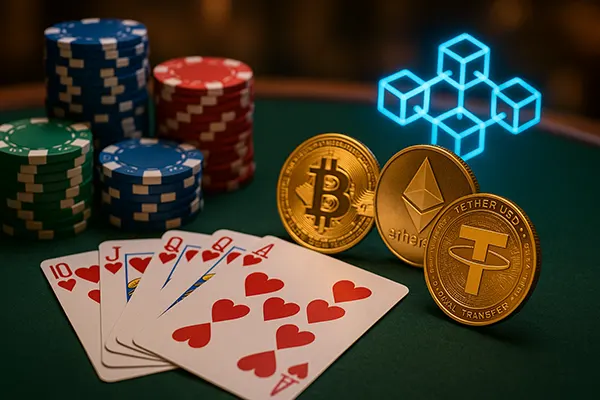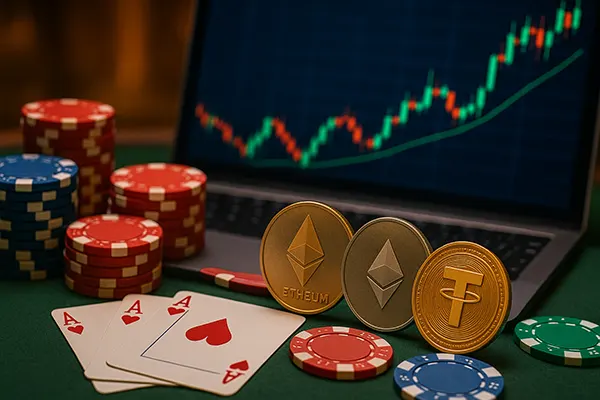
Poker and Cryptocurrencies: How Players Use Tokens, NFTs and Blockchain Before, During and After the Game
Poker and blockchain technology have begun to intertwine in ways that go far beyond simple digital payments. In 2025, the combination of decentralised finance and online poker has evolved into a new ecosystem that redefines how players store value, trade in-game assets, and prove fairness. From cryptocurrencies used as chips to NFT-based identities and blockchain-driven platforms ensuring transparency, the poker industry is experiencing a technological transformation that shapes both gameplay and reputation.
The Integration of Cryptocurrencies in Modern Poker
Over the past decade, Bitcoin and Ethereum have shifted from experimental assets to mainstream tools for online poker. Many poker rooms now allow deposits and withdrawals in stablecoins like USDT and USDC, offering faster transactions and lower fees than traditional banking. This enables players to move funds globally without waiting days for verification or dealing with high conversion rates.
Privacy and decentralisation have also become central advantages. Using cryptocurrencies allows players to maintain greater anonymity while ensuring financial security. Blockchain verification protects against manipulation and guarantees that funds remain under the player’s control until the end of each session.
Furthermore, the rise of blockchain-native poker platforms has brought provably fair algorithms, where every hand can be mathematically verified. This transparency builds trust, particularly for high-stakes players and tournaments where fairness is paramount.
How Tokens Simplify Transactions and Rewards
Tokens have become an essential mechanism for both in-game currency and reward systems. Poker sites now issue native utility tokens that grant players loyalty bonuses, rakeback, or participation in special events. These tokens are often tradable on decentralised exchanges, giving real-world value to a player’s activity.
Smart contracts automate prize distribution and ensure instant payouts, reducing disputes and eliminating the need for intermediaries. This level of automation creates efficiency, particularly in tournaments with large numbers of participants, where manual processing was once prone to delay.
Additionally, token-based economies introduce a new level of engagement. Some poker ecosystems offer governance tokens, allowing players to vote on platform updates, tournament structures, or promotional campaigns. This community-driven model strengthens loyalty and enhances long-term sustainability.
NFT Avatars and Identity in the Poker Metaverse
Non-fungible tokens (NFTs) have evolved beyond mere collectibles into a form of digital identity for poker players. NFT-based avatars allow participants to represent themselves uniquely across multiple poker platforms while maintaining ownership of their digital persona.
Some NFTs also grant functional privileges, such as exclusive tournament access, seat reservations, or revenue-sharing options in decentralised poker ecosystems. This approach merges entertainment with investment potential, turning a player’s digital presence into a tradable asset.
Beyond personalisation, NFTs can serve as verifiable achievement records. Each tournament win or milestone can be minted as a blockchain certificate, preserving the authenticity of a player’s career record and preventing falsification.
The Role of NFTs in Player Communities
Player communities now use NFTs to strengthen engagement and create social networks around shared digital ownership. Poker clubs issue limited-edition NFT passes that unlock membership benefits and private events, creating an exclusive yet transparent environment.
This form of gamified membership replaces traditional loyalty programmes with blockchain proof of ownership. It rewards long-term commitment, giving members early access to tournaments or special drops of branded items and collectables.
Moreover, NFTs bridge the gap between poker and broader metaverse experiences. Players can use their avatars or digital trophies in virtual environments, linking poker identity to the larger Web3 social ecosystem and enhancing visibility within the gaming community.

Blockchain as a Tool for Security and Transparency
One of the strongest arguments for blockchain integration in poker is its ability to ensure fairness and traceability. Every transaction, from bets to prize distributions, is recorded on an immutable ledger. This prevents fraud and builds trust among players, operators, and regulators alike.
Smart contract technology eliminates the need for centralised control, meaning that funds and game outcomes are managed through automated and verifiable code. Players can independently confirm that deck shuffles are random and payouts accurate, removing the risk of manipulation.
Additionally, blockchain enhances compliance. By integrating Know Your Customer (KYC) and Anti-Money Laundering (AML) systems directly into blockchain verification layers, operators achieve transparency without compromising user privacy. This balance between regulation and anonymity represents the next evolution of responsible gaming.
The Future of Poker and Blockchain Innovation
The intersection of poker and blockchain is expected to deepen in the coming years. Layer-2 scaling solutions and interoperability between chains will allow instant cross-platform gaming, making cryptocurrencies even more efficient for poker ecosystems.
Artificial intelligence and blockchain oracles will further enhance fairness by monitoring betting patterns and detecting suspicious activities in real time. This technology-driven oversight ensures a safer, more competitive environment for both casual and professional players.
In the long term, decentralised autonomous organisations (DAOs) may even replace traditional poker operators. These player-governed entities would run poker networks democratically, distributing profits transparently among stakeholders and eliminating intermediaries entirely.

